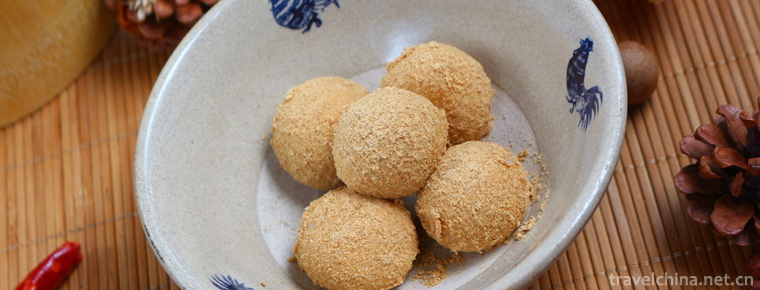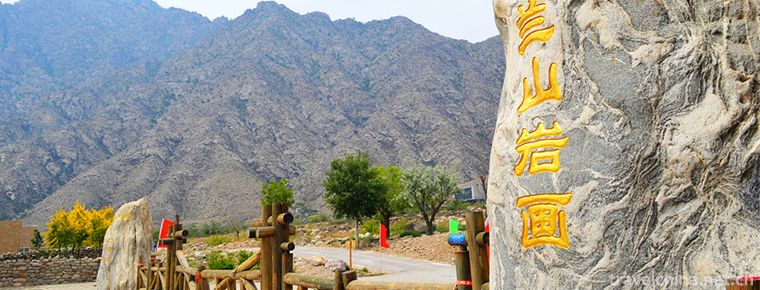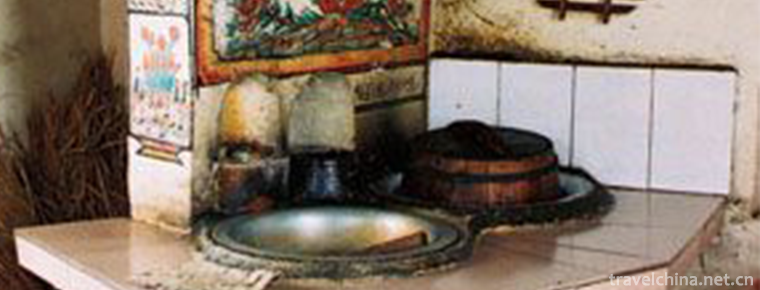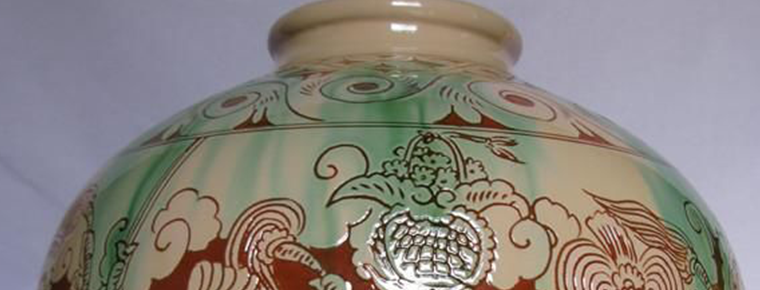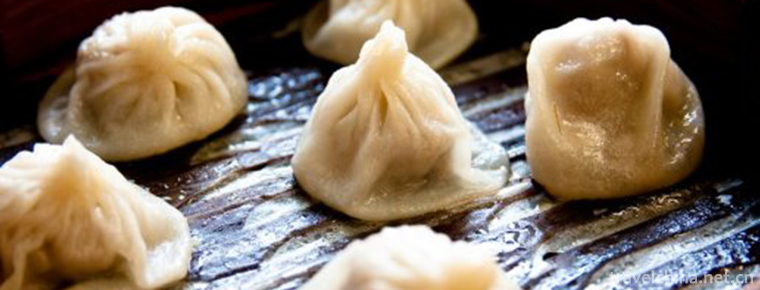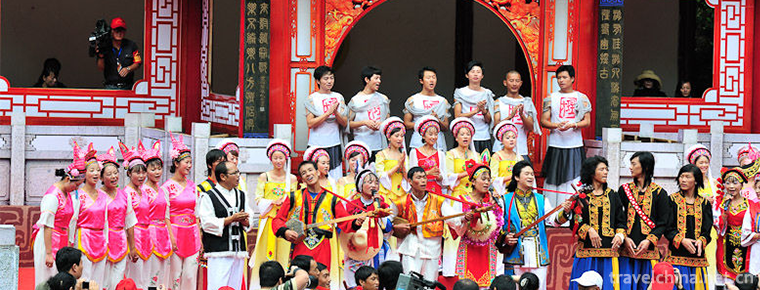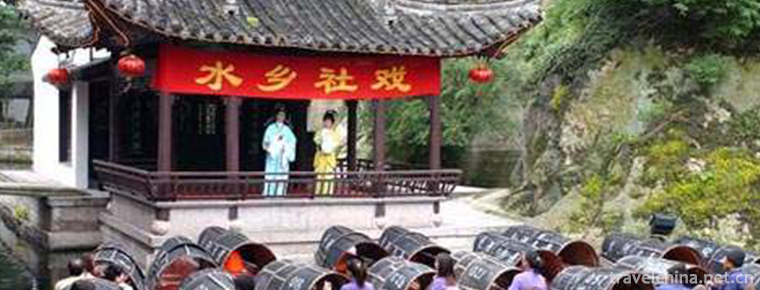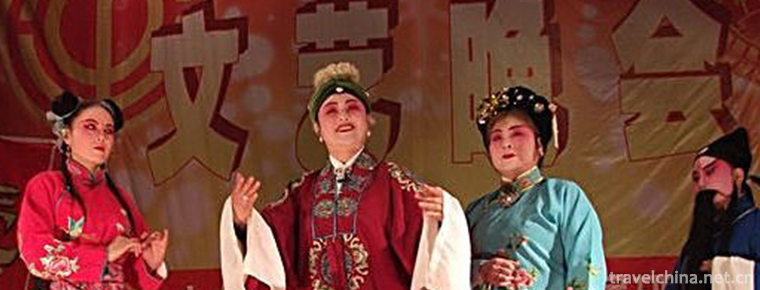Baisha Xile of Naxi Nationality
Baisha Xile of Naxi Nationality
Naxi Baisha Xile is also known as "Xiaoli at breaking time", "Xiaoli at breaking time", "Xili at breaking time", "Xili at breaking time" and "Xie Li at breaking time". Spread in Lijiang ancient city and Yulong Naxi Autonomous County. Baisha fine music is a large-scale funeral song and dance, instrumental music suite, which is still preserved and inherited from the Naxi people, including dance songs, songs and instrumental music cards. Naxi Ancient Music (Dongjing Ancient Music, Baisha Xile) in Lijiang, Yunnan Province, which was awarded the title of "Precious Cultural Heritage of All Human Beings" by UNESCO, is the artistic crystallization of the integration of multi-cultures. Naxi ancient music, composed of various cultural backgrounds, has a unique and mysterious charm and is a valuable heritage of Chinese folk art. Baisha fine music is a large classical music suite that integrates song, dance and music. It is known as the "living fossil of music".
On May 23, 2011, Baisha Xile of the Naxi Nationality was listed in the third batch of national intangible cultural heritage list with the approval of the State Council.
historical origin
According to local chronicles, Baisha Xiyue was popular in Lijiang in the middle of the nineteenth century, more than two hundred years ago. It was a music handed down in the Yuan Dynasty. It is said that in the mid-13th century, Baisha, north of Lijiang, was the political, economic and cultural center of the Mutian King of the Naxi Nationality. Legend has it that Kublai Khan of Mongolia (that is, the ancestor of the Yuan Dynasty) was greatly helped by the Mutian King of Lijiang during his expedition to Dali. When Kublai Khan triumphed, he gave some bands and musical instruments to the Mutian King with his army, among which there was no fire. Music played with this instrument was later called "White Sand Fine Music".
Fire has been circulating in Lijiang. In the early days of the founding of the People's Republic, Naxi artists performed this music and wore Mongolian costumes. This kind of white sand fine music consists of three parts: song, dance and instrumental music. Now mainly instrumental music, the orchestra is composed of clarinet, flute, reed, Su Gudu, Zheng and Huqin.
There are many views about the historical origin of Baisha Xile. Because of the long history and lack of information, the history of music is even more complicated. From the sources of various statements, it can be roughly divided into three categories:
Ancient Documents
As recorded in Lijiang Prefecture Zhiluo compiled by Qianlong in the eighth year of the Qing Dynasty (1743), there are songs, dances and dances of all kinds of Yi people, and musicians call them "fine music". Zheng, flute and Pipa are the same as those of the Han Dynasty. Its tune also has the names of "Nao Ling", "A Book" and "Parasitic Grass", which are passed down as the Yuanren legacy. This is the earliest known record of the history of Baisha Xile, believing that it began in the Yuan Dynasty. Similar to this statement, there are also records in Lijiang County Chronicle in the late Qing Dynasty: "In reality, Taidi Gecang crossed the Yangtze River. His music has been handed down to Huqin, Zheng, flute and other instruments. His tunes include Nanbeiqu, Nao Ling, A Book and Parasitic Grass. At the time of its founding, the master invited the musicians to play Lingbian, which is called "fine music". It is very melancholy and moving. Its origin is also sent to it." Thus, Baisha Xile has been used as a sad music at least in the Qing Dynasty. According to the Yunnan Series, Mr. Yixiao's poet Banknote Judian Juren, it said: "This song was originated from the folk. When Mu Shi was in its prime, Yongning Yi attacked all the people, and Mu Shi set up a desert in the north to wait for it and wiped out the Yi. Folk made this song to hang it, the ancient cloud'Beisha fine music'. "Fine pear" person, fine music also..." Mr. Yixiao (1827-1887), the author, is a member of Lijiang People's Family, which is obviously different from the two records mentioned above.
Folklore
There are also many such statements, mainly two kinds. It is said that Baisha Xile was one of the gifts Kublai Khan gave to Aliang, the leader of the Naxi nationality. In the first year of Lizongbao in Southern Song Dynasty (1253), Mongolian Constitutional Ancient Constitutional Emperor ordered his younger brother, the later ancestor of Yuan Dynasty Kublai Khan, to March personally to Dali. Aliang, the leader of Naxi, was very respectful in meeting the Mongolian soldiers in Cheba River. Shortly afterwards, Kublai Khan broke through Dali and, while returning his teacher to the north, thanked Aliang by calling him "Tea Hunzhang in charge of the people", and also gave him a lot of gifts. Among them, it includes half of the musicians and half of the score. The story of Kublai Khan's Southern Expedition is clearly recorded in the Ming Dynasty's Naxi genealogy "Mu's Eunuch Genealogy". But there is no mention of music in the record of gifts. The second is for Princess Dragon. Legend has it that King Mutian wanted to annex Sifan, so he married his daughter Princess Dragon to Prince Sifan. When the Dragon girl learned the news, she wrote a letter, hung it around the dog's neck and took it to the West Fangguo. When Prince Sifan knew about this conspiracy, he led his troops to attack Lijiang, but was defeated by King Mutian. King Mutian Xuan imprisoned the princess in the Yulong Pavilion in Yulong Lake. After the death of the princess, people created Baisha Xile in memory of her. So Baisha Xile has a kind of sad mood like the cold wind, light rain and frost soul of the moon. Often there are people who feel sorrow from the misery of the red dust and cry aloud after hearing the music. This is a beautiful story, which also includes Baisha Xiyue's famous song "A Book", "Princess Crying", "Barefoot Dance", "Ali Rieger Jipai" and so on.
Contemporary Scholar Research
For example, Mr. Mao Jizeng, a Beijing scholar, visited Lijiang in 1962. According to the survey data, he believed that Baisha Xile might have been introduced into Lijiang by the Mongolian army in the Yuan Dynasty when it entered Yunnan. Because some Mongolian soldiers stayed in Lijiang for a long time, the music has been spread to the present day with them. In addition to the above two records, there are also the following points: 1. It is a fact that some Mongolian soldiers are stationed in Lijiang. Nowadays there is a village whose name is translated into Chinese as "the village inhabited by Mongolians", and some local people also call themselves descendants of Mongolians. 2. Performing Baisha fine music while working in Mongolian costume, while other folk performing arts do not have this custom. 3. Among the bands of Baisha Xile, there is a kind of "Su Gudu", whose form is basically the same as "Huo Busi" recorded in the history of Yuan Dynasty. Neighbouring areas of Lijiang and other parts of Yunnan do not have this instrument. In addition, Huang Zhenfang, a Yunnan scholar, believes that Baisha fine music is not only a "Yuanren legacy", but also a Kunqu opera introduced to Lijiang, Yunnan, in the mid-Ming Dynasty. Its basic form is the combination of North and south. Mr. Huang mainly makes textual research on the name of the music card, the music form and the accompaniment characteristics, as well as the analysis of other historical materials.
Inheritance Significance
Baisha fine music combines Yuanming legacy and Naxi folk music. It is a suite formed gradually after quite a long time. Its conception is original, instrumental music combines singing and dancing, artistic conception is deep, melody is lyric, melody is euphemistic and fluent. Since the founding of New China, Baisha Xile has attracted the attention and attention of cultural and academic departments at all levels and music experts and scholars at home and abroad. Since the 1960s, a group of well-known domestic scholars have come to Lijiang to investigate and study Baisha Xile, and have made many useful explorations in protecting, inheriting and promoting Baisha Xile.
There are fewer and fewer people who can play Baisha fine music in Lijiang. The governments at all levels and relevant departments in Lijiang have done a lot of effective work to promote Baisha fine music. They have tried their best to protect and rescue this wonderful cultural flower under the impact of modern civilization.
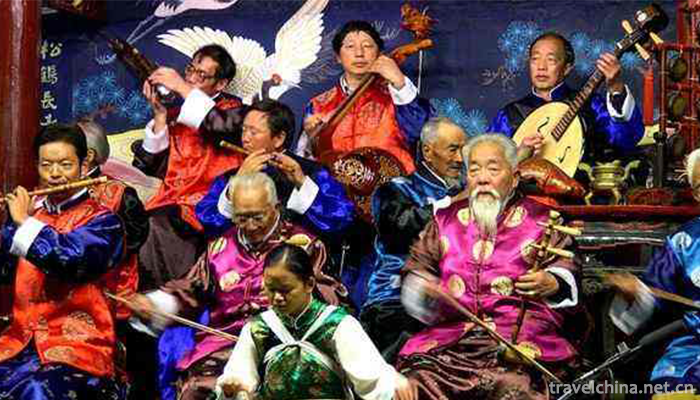
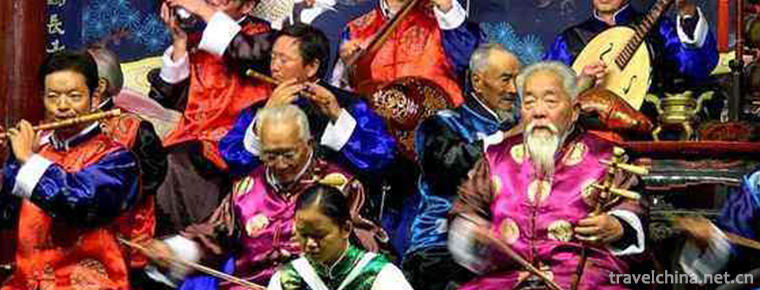
Baisha Xile of Naxi Nationality
-
Tianmenshan Mountain tourist area
Views: 170 Time 2018-12-12 -
Helan Mountain Rock Painting
Helan Mountain Rock Painting is a national key cultural relics protection unit, the national AAAA level tourist attractions, the national research tourism demonstration base (2016 one of the first 20)
Views: 120 Time 2019-01-13 -
Lao Leshan Tourist Scenic Spot
Lao Leshan is located in the south of Henan Province, 9 kilometers southwest of Zhumadian City and 8 kilometers west of Queshan County. National Highway 107
Views: 152 Time 2019-01-29 -
Eight treasure pear pot
Babao pear can is a delicious name, belonging to Shandong cuisine. Babao pear cans are exquisitely made and beautifully shaped, mostly for beets at banquets. If high-grade banquet, can be filled in sm
Views: 253 Time 2019-03-26 -
Jiaxing Kitchen Head Painting
Jiaxing stove painting is a form of Jiaxing folk art. Folk artists use painting pigments to draw patterns on the various parts of the kitchen wall, also known as "kitchen paintings" and &quo
Views: 363 Time 2019-05-05 -
Firing Techniques of Jieshou Coloured Pottery
The firing technique of Jieshou colored pottery, the local traditional handicraft technique of Jieshou City, Anhui Province, is one of the national intangible cultural heritages.
Views: 126 Time 2019-05-06 -
Traditional Cuisine Skills of Shanghai Bengang Cuisine
Benbang cuisine is a nickname for Shanghai cuisine and an important school of Han traditional catering culture in Jiangnan area. The so-called Ben Gang is local. It is characterized by thick red sauce
Views: 155 Time 2019-06-13 -
Shibao Mountain Song Club
The Bai Jianchuan Shibao Mountain Song Festival is held every year from 27 to 29 July of the lunar calendar for three days. At this time, tens of thousands of young Bai men and women and singers from
Views: 189 Time 2019-06-15 -
Shuixiang Opera
Shuixiang opera is a traditional folk cultural activity in Shaoxing, Zhejiang Province. Waterfront theatres are mostly built on rivers in front of temples such as land temples, so they are called &quo
Views: 189 Time 2019-06-16 -
Xihe Opera
Xihe Opera, also known as Xingzi Xihe Opera, is a traditional opera popular in Xingzi, De'an and Jiujiang counties and cities of Jiangxi Province. Its main vocal cavity is Pihuang, also known as "
Views: 139 Time 2019-07-01 -
Deyang natural resources
Deyang City is a subtropical evergreen broad-leaved forest area in Sichuan Basin. The horizontal distribution of vegetation is not different, but the vertical distribution difference is obvious. The forest vegetation is complex and diverse, and the vegetation community
Views: 329 Time 2020-12-14
